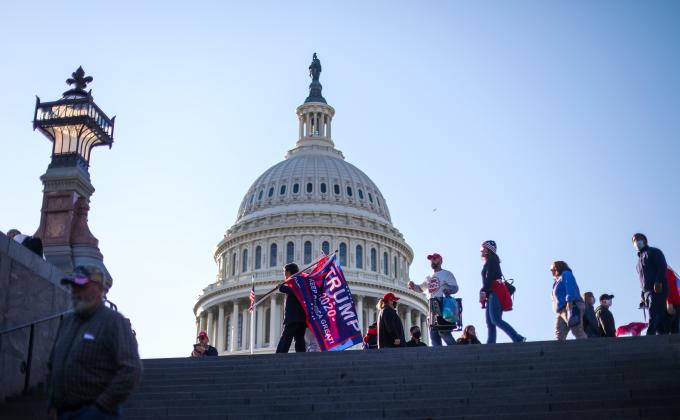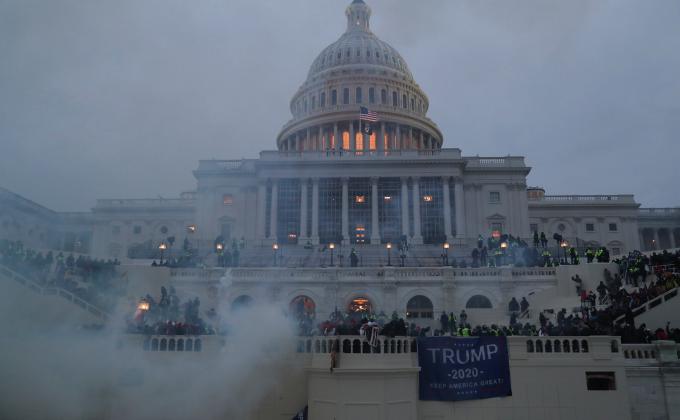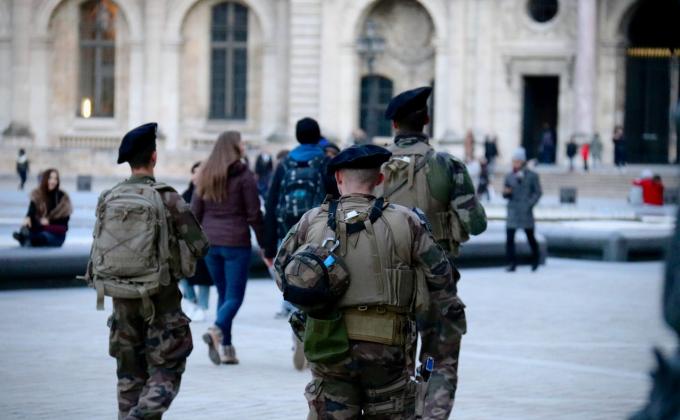On the early morning of 7 December 2022, around 3,000 German police officers including specialised tactical response units began searching premises and arresting suspects across the country at a scale which might be the largest counter-terrorism operation targeting far-right domestic extremists in the history of post-WWII Germany. Officers searched over 130 properties in eleven German states, and 25 suspects were arrested with the overall investigation focusing on 52 persons, alleged to have formed or support a terrorist organization and to have plotted to overthrow the German government. Naturally, with an ongoing counter-terrorism investigation, there is still much we do not know. For example, we currently have no idea how influential QAnon (see the below) truly was for the members of this group. Nor do we know yet how deeply involved, and how many of the group’s members were involved in the Reichsbürger movement or other conspiracy milieus. We have no reliable information yet on how far the group had progressed in their plans. Eventually, the trial and verdicts will show this. But since the authorities are now entering the stage of sifting through the data and evidence collected during the raids, the current picture is likely to evolve and change up until any trials are held/convictions can be reached.
Despite this critical caution not to jump to conclusions and maybe even jeopardise the investigation, the authorities and seemingly well-prepared news outlets were quick to release a trove of information. This Perspective discusses what we currently know and discusses what it means in the context of the history of far-right terrorism in Germany.
The context
According to the official press release from the Federal Prosecutor General’s office, the group of arrestees consists of 24 German and one Russian national. The arrested suspects allegedly belong to a terrorist organisation founded at the end of November 2021, which aimed to remove the existing political order in Germany by force, and to replace it with its own already established system. The members of the group were allegedly motivated by a mixture of conspiracy theories consisting of narratives of the so-called Reichsbürger (sovereign citizen), as well as QAnon ideology. Driven by the belief that Germany is currently ruled by members of a so-called Deep State, they hoped to achieve or cause a liberation through the intervention of the Alliance, a technically superior secret alliance of governments, intelligence services and militaries of various states, including the Russian Federation and the United States of America. The group members also, according to the official press release (linked above), apparently believed that members of the Alliance are already in Germany and that their attack on the Deep State is imminent.
The fight against the remaining institutions and representatives of the state was to be carried out by the group and a country-wide network of so-called homeland security companies founded by members of the group. Mainly responsible for this task was the military arm of the group. The use of deadly force was wilfully and consciously integrated into the group’s plans. After removing the current government, the group envisioned creating a military transitional government and negotiating a new state order in Germany with the Allied powers of WWII with the main contact being the Russian Federation. One of the group’s members, a member of the German nobility, had already made contact with Russian representatives in Germany on the group’s behalf. According to the investigators, there is no evidence the Russians responded positively to this approach.
The group had already begun extensive preparations, including the planning of administrative-like structures, the procurement of equipment, the implementation of shooting training, and the recruitment of new members. The group also appears to have had various specialised councils for different tasks, such as Justice, Foreign Affairs and Health. Some of the group’s members had served in the German army (the Bundeswehr) in the past, and were tasked with forming the so-called homeland security companies in the group. Recruitment efforts focused primarily on members of the German armed forces and police. The specific terror plot allegedly evolved around preparations to conduct an armed attack on the German Parliament Building (the Reichstag). How far these allegations will hold up in court and lead to actual convictions is not possible to determine at this point.
Why is this plot significant?
Beyond this officially released information above, there are several key aspects that can be highlighted as significant.
First and foremost, the mention of the international conspiracy theory and extremist movement QAnon stands out. This movement and its conspiracy narratives have surged in Germany since they arrived roughly together with COVID-19 pandemic in early 2020. The main study looking at QAnon in Germany by the CeMAS institute estimates that around 12 percent of the German population might partially or fully agree with it. Still, it comes as a surprise that compared with what is currently known about QAnon crimes and terrorism in its home turf the United States this German case could very well be the largest QAnon terror group and plot worldwide in the history of this movement, if indeed it can be proven in court that this ideology was a main driver behind this group.
Second, the group and plot were connected to the German sovereign citizen movement called Reichsbürger by the authorities in the official press release. The milieu is estimated to involve around 21,000 persons who are known to have committed over 1,000 extremist crimes in 2021, of which 187 were acts of violence. Despite some widely reported violent confrontations with the police, such as the 2016 Georgensgmuend shooting and killing of a tactical response unit police officer or a 2022 shootout with the police in Boxberg, the most detailed study of crimes by those extremists currently available clearly shows a major pattern: they react violently to any kind of law enforcement activity directed at them. Up until very recently, when a group called United Patriots was discovered in April 2022 that plotted to kidnap the Federal Minister of Health Karl Lauterbach and force the German government to resign by force, Reichsbürger have never formed a terrorist organisation and plotted or carried out acts of terrorism proactively on their own – at least not to a point where the authorities could prove this in court and have them convicted and sent to prison for it. From the events this week, we can see that some members from this environment have radicalised further, taking the next step from violently resisting arrest or removal of their guns to plotting attacks on the state. The evolution of terrorist organisations and plots is, however, novel and might be according to one of the leading experts on this movement in Germany Verena Fiebig, connected to the infusion of this movement with international conspiracy narratives such as QAnon. Yes, Reichsbürger are extremists and at times violent, but before the pandemic hit, they were hardly the largest domestic threat in Germany, on the contrary. The impetus to proactively and aggressively attack the state could be a new and particularly dangerous component brought into the movement by QAnon and other transnational extremist narratives.
Third, several of the group’s members are veterans and have received military training, at least one is a former police officer and another one an active-duty soldier. Four of those with a military background had served (one was still on active duty at the time of the arrests)with the elite special forces unit “KSK” (Kommando Spezialkräfte) at one point in their career, a unit that has made international headlines due to extremist incidents. Most notably, a full combat company had to be disbanded in 2020, when it was found to be irreversibly influenced by extreme right ideology. Many of those former and active soldiers in this new group were known anti-vaxxers and COVID-19 denying conspiracy theorists, who also participated in the so called Querdenken rallies (an extremist environment that spread across Germany to protest what they see as illegal measures against the pandemic). With the globally heightened interest in what makes military personnel vulnerable to extremist radicalisation, more and more studies have been published in recent years, most notable one on extreme right radicalisation of special forces and elite police units. In short, a combination of elite warrior subcultures, toxic masculinity, echo chamber effects, and cognitive rigidity could make these individuals more susceptive to extreme right narratives and radicalisation.
Fourth, compared to the history of extreme right terrorism in Germany, this group (based on currently available information) appears to be one of the largest and organisationally most sophisticated that has appeared in decades. Again, the trial and verdicts will have to show the exact composition and preparation stages, how the organisation evolved, and if/how it was connected to other networks. As a hypothesis, the combination of conspiracy-based extremist movements such as QAnon, anti-vaxxers and other factors might have accelerated the growth of what I have called “hive terrorism” in the past: a fluid terrorist milieu made up mainly of persons who radicalise without prior involvement in or with attachment to traditional extreme right milieus.
Finally, German authorities have shown a unique determination to root out far-right violence and terrorism that stands out among Western nations. The number of raids, arrests, trials, and verdicts targeting the extreme right have significantly increased in recent years. Despite regular criticism and allegations against the police and the military to be “blind on the right side”, the fact that such raids and investigations also identify and sweep up individuals with prior or current links to the armed forces and law enforcement should encourage other nations to constantly remain vigilant and ensure that extremists within the ranks are found, removed, and punished if possible.
What next for Germany?
With the very limited reliable information currently available, it is exceptionally difficult and oftentimes even questionable to come to any conclusions regarding what this case means for the far right and domestic extremism in Germany. This is not the place nor the time to determine the character of this group and the impact of its detection for the German counter-extremism landscape.
Still, what we know so far indicates a worrisome potential increase of a trend in German violent extremism that is observable for some years now, namely conspiracy-driven violent acts and plots. These have ranged from Hanau mass shooting killing 19 victims in February 2020, to the murder of a gas station clerk in Idar-Oberstein on 18 September 2021, or the murder-suicide in the town of Königs-Wusterhausen in December 2021 leaving five victims dead, including the perpetrator. All of these ideologically driven violent acts have in common that they are driven mainly by conspiracy beliefs instead of specific extremist political or religious ideologies. Not less dangerous, this apparently new amalgam of traditional extremist ideologies (or bits and pieces of them) with transnational highly conspiratorial thinking and the networks that have developed of the last years might have warped the evolutionary processes within extremist milieus to produce more outlier threats from the perspective of counter-terrorism.
What is certain at this stage already is, however, that counter-extremism and counter-terrorism in Germany and arguably in many other Western countries are facing the birth of a new form of extremism that defies traditional categories. At the very least, this must be seen as an urgent call to adapt our current strategies and responses from preventing to countering and combatting violent extremism and terrorism to prepare for significant challenges that appear to be lying ahead.
This publication represents the views of the author(s) solely. ICCT is an independent foundation, and takes no institutional positions on matters of policy unless clearly stated otherwise.
Photocredit: Tomasz Warszewski/Shutterstock








